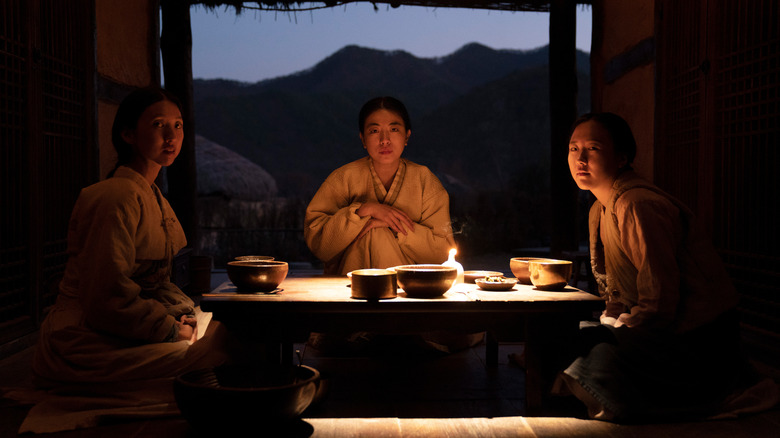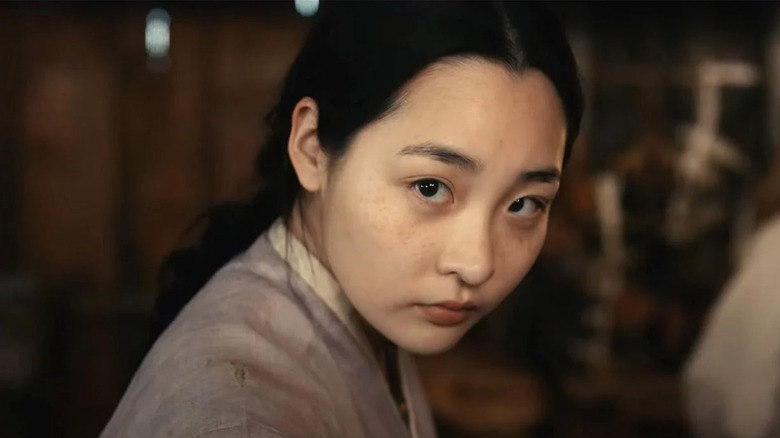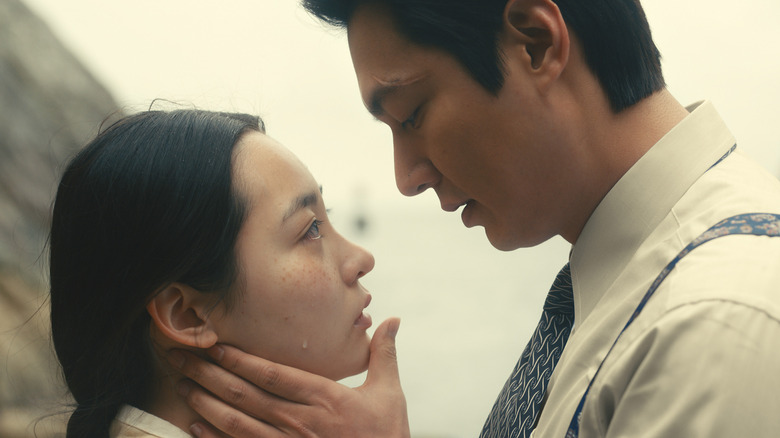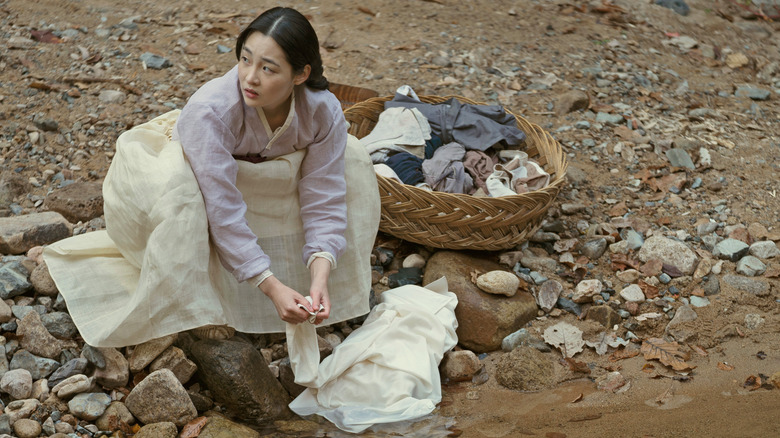Pachinko Directors Justin Chon And Kogonada On Uniting Their Styles For The Series [Interview]
The multi-generational saga of the new Apple TV+ series "Pachinko" takes special care to strike a delicate balance between an epic scope and an intimate tone. Telling the tale of a Korean family struggling to thrive in a hostile environment, the show chronicles the disparate hopes and dreams of four generations, each faced with their own set of challenges and existential questions. Even as we jump between two timelines, one tracing the story of matriarch Sunja (Minha Kim) and the other her grandson Solomon (Jin Ha), we're immersed in the specificity of their lives, set against a grand backdrop as they move between countries depicted through vibrant visuals. The ambition of "Pachinko" is purposeful, giving the story based on Min Jin Lee's novel the space it deserves to truly thrive — and naturally this could only be accomplished with the right directors in charge.
Kogonada and Justin Chon helm "Pachinko," two directors whose stylistic contrasts were a deliberate consideration. The series was neatly split between the two, with Kogonada helming the first three episodes then returning to direct the penultimate, while Chon took care of the middle three and the season finale. Kogonada dubbed this "the perfect handoff," as he establishes the beginnings before turning the series over to Chon, just as the world expands with Sunja's journey from Korea to Japan. Beyond "Pachinko," Kogonada is making a major splash: His latest feature film, "After Yang," debuted to rave reviews at last year's Cannes Film Festival, and the hype continued when the film arrived at this year's Sundance and subsequently played to wider audiences. As for Chon, the writer-director has firmly established himself since wowing Sundance audiences with his 2017 film "Gook," having followed up with "Mr. Purple" and last year's "Blue Bayou." Upon learning this adaptation was in motion, both directors were quick to sign on, which Kogonada partially attributes to the golden opportunity for exploration:
"I think that the best art thrives when you're not just trying to tell something like a message, but when you're really using the medium to explore something that is still unknown to you."
"Pachinko," an emotionally woven immigrant tale, was also a chance to explore their own identities as members of the Asian diaspora and prod at larger questions of displacement and generational tensions — questions their previous work has also grappled with. In a recent interview, they told us about bringing this acclaimed story to the small screen, finding universality in specificity, and more.
This interview has been lightly edited for clarity and brevity.
'It's the perfect handoff and the perfect filmmaker to take that and bring it to the end'
How did you both approach uniting your different directing styles for the series?
Chon: Well, I'm a huge fan of Mr. Kogonada.
Kogonada: I'm a bigger fan of Justin!
Chon: [Laughs] We actually were at Sundance at the same time and I saw his film "Columbus" and just thought it was incredible. So, so different from what I do. And I thought, "This is going to be really fun," because just to be able to collaborate with a fellow Asian American filmmaker that I respect is almost impossible. It rarely happens. I was incredibly excited.
Kogonada: I was as well. I mean, I think what Justin is doing in filmmaking is incredibly exciting. The pace at which he is making these films, the stories he's telling, and his ongoing style is ... for me, the idea of him doing "Pachinko" was thrilling. So I was happy to get to do that and just to see how our styles would be able to cover the spectrum of this story. And I think the real brilliance of it is in the way — right where the handoff takes place is when this story really starts expanding and really becomes dynamically emotional. I just think he does such a great job of navigating that kind of space and giving attention to every character, as the world just starts continuing to grow and the tensions grow.
For me, it's the perfect handoff and the perfect filmmaker to take that and bring it to the end. [At] the very end of that show, he also graciously turns it and really does create a bookend to where it started. The thing I would take away is, you don't ever get to work alongside another filmmaker when you make a film. It's very lonely, sort of like only you're doing this one task. So I would only see him, but now I've seen the results. It was really nice to get to know Justin better and to feel like there was someone who was on this very long journey and could understand it at that deep level.
Chon: Thank you.
'These are the questions of art. These are the questions of being human'
Usually, when we think about immigration tales, they tend to be these very personal, small-scale, intimate stories, and it's really incredible to see it blown up into this enormous, sprawling epic and have that be the approach. How did you think about telling a personal story and also making the world feel so huge?
Kogonada: Oh, I'm interested in your answer.
Chon: About the immigration experience? I think –
Kogonada: But at that level, because you've done such a good job with your three stories that I've seen, bringing it to this scale.
Chon: Well, again, I think it comes back to the source material. I think the novel itself is so sprawling and covers so much time. And the brilliance of [showrunner] Soo [Hugh] to reel that in and also expand upon the novel and create this interweaving structure, it's just dynamic. I guess all we can do is break it down to manageable, digestible storylines. I think that's the key to this is that, yes, it's epic in scope, but intimate in tone.
Kogonada: Yeah.
Chon: It does get quite intimate, but that weaving allows it to have that sprawling element and larger-than-life feeling. I don't know, man. It just always comes down to telling stories about humans and the specificity of that, and then everything else is just garnish.
I'm curious about how the idea of displacement plays into that.
Kogonada: I was just saying that this issue of displacement in my own life has been such a constant, ongoing conversation in my head, because I think it's the one thing that I, maybe in my own construction of my identity, I realize that it's the baseline for me. Not a place as much as the feeling of being displaced. So I think anyone who feels a part of any diaspora can feel that, but I also think it might be the human condition in our modern world. We are fragmented people. Change happens so rapidly that maybe we all struggle with a sense of displacement. But, the specificity of displacement for those who have immigrated or those who are no longer a part of the history, or geography, or location that they're originally [from], or that their family is from, is a real thing.
How you understand your past, your future, what it means to both be in the world, and what it means to be your ethnicity in a place where there's tension and conflict — I mean, these are the questions of art. These are the questions of being human. These are just the questions of what it means to be a family. So yeah, I just think organically — and of course, this is so much the story — but I think for us, we are trying to work through that. And I think that the best art thrives when you're not just trying to tell something like a message, but when you're really using the medium to explore something that is still unknown to you, you know? And so, this space allowing us to explore that, I think was also what was rewarding.
'If you can't feel the intimacy and the texture of your world, then it just feels like an abstract Wikipedia entry'
As you both read the novel either before or after signing on, was this a world that you were already envisioning onscreen ... and did it end up like that initial vision?
Chon: I don't think I ever thought I'd do something like this. I heard stories growing up from my grandmother about this time. I don't think I have had the capability of tackling something like this in terms of the creation of it. Which is why reading the novel was ... I had a great sense of appreciation that someone dove in so deeply and explored these existential topics. So then, when you're afforded the opportunity to be able to explore something that they've built in terms of the script and the novel, there's really no option. You just have to do it.
Kogonada: Same. I read it, was moved by it personally, shared it with my family, knew that they would be moved ... I think my wife actually read it a couple of years before in a book club, and she was like, "Oh, I've read this incredible book. Your family would love it." And at that point it wasn't a project yet, and then once you find out that it is, and then you see the way it's going to be adapted and it's so visual, you can imagine it. You just want to be a part of it at the end of the day.
On that visual aspect, it really feels like the smallest details of this world are what make it feel so real. How did details like food and clothes, and even the small details of the places that we're in, how did that play into your approach?
Chon: Again, it starts with the writing and those are all woven in its DNA. But I think these are elements that every culture can relate to. Even though it's the actual — in its specificity, it becomes universal. Everybody and every culture has their food. The way they handle a certain type of food that's a delicacy, or an everyday item or whatever in that specificity. I think people can relate. Same thing goes with clothing, right?
Kogonada: If you can't feel the intimacy and the texture of your world, then it just feels like an abstract Wikipedia entry or something. So it really does, I think you rightly point out and it's a huge compliment. I think for both of us, because we are filmmakers that love those elements, the details and the things that ground story. So I'm delighted that you felt that in the series.
Did either of you direct the opening sequence?
Chon: No, no, no, no. I think we just both sent our DPs.
Kogonada: Yeah, our DPs, because there was just a lot. But really it's Soo's vision, the showrunner. I mean, we went through a lot of possible opening credit sequences. And I think she just wanted to do something that would have a different soundtrack and not to do what was obvious, which was to, I think Justin said in a different interview, create this orchestration and make it this sad, epic kind of intro. She had this other idea in mind, which was really lovely and kind of — it's a contrast, but it doesn't seem like a contradiction.
The first three episodes of "Pachinko" are now available to stream on Apple TV+, with new episodes debuting weekly on Fridays.



